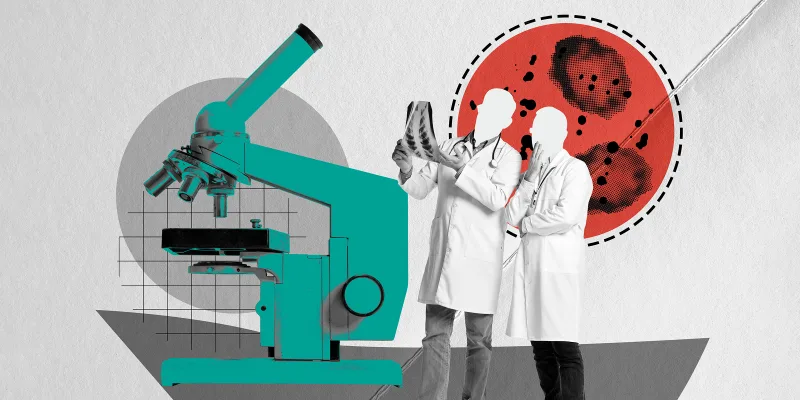My earliest encounter with appendicitis was when I was in medical school, but not via textbooks and CT scans, in the way that you would expect. I had stayed up late studying and decided on Taco Bell for a late-night snack. For some reason, half an hour after eating, I ended up on the treadmill, maybe to work off those excess calories. A few hours later, I had abdominal pain unlike anything I’d ever had. I'm not prone to abdominal pain. And yes, it was periumbilical. I was rolling around, writhing in bed, and I couldn't get comfortable. In the morning, thinking it was a terrible bout of gas (those bean burritos will getcha) that would pass, I tried some Gas-X and went to class.
I was still in my second year of medical school in our renal course and I remember sitting there sweating. Halfway through the lecture I stood up and said, “I’m so sorry, something’s wrong. I have to go.” The pain was so intense that I went immediately to the school nurse. She poked me in the right lower quadrant and when I jumped as she let go, she said, “Yep, you have rebound. I’m sending you to the ER.” Do not pass Go, do not collect $200. I’d gotten a CT scan by the time my then-girlfriend, now-wife, met me there.
The next few hours were a bit of a haze. I had a blood test and I distinctly remember the WBC being about 14,000. It meant nothing to me at the time as a medical student who had not yet seen a clinical rotation. Then they told me I had appendicitis, which again I barely understood the significance at the time, aside from knowing approximately where the appendix was. Now that I’m a surgeon, how I wish I had a copy of that CT scan so that I could see my own appendix and evaluate it like I do my patients’ appendices — the length of it, the base of it, whether it was retro-cecal, or whether there were any signs of perforation or phlegmon. Is it dilated? If any of you out there work at Sparrow Hospital in Lansing, MI, in radiology, and can get me a copy of that CD, I would be forever grateful.
In any case, I also remember very distinctly what the surgeon said as he stood at my bedside: “Well, you have a very treatable problem.” That was over a decade and a half ago and, to this day, when I see a straightforward appendicitis patient, I walk in and say, “Well, you have a very treatable problem.” I admit there are times when such decision-making is relatively more difficult, such as in perforated appendicitis, or when there are signs of a mucocele appendix or suspicion of cancer, or when the patient has other comorbidities, but most of the time appendicitis is bread and butter general surgery, as straightforward as you can get, and as fun of a laparoscopic procedure as you can do in about 12 minutes, skin to skin.
Even as a resident, I had those attendings who kept the patient on antibiotics overnight for three days until it was a more convenient time to operate on them and we knew that it wasn't standard of care because taking out the appendix and sending the patient home on the same day was preferable for everybody except for the attending surgeon. The delays in care generally led to increased length of stays and out-of-pocket costs for the patient and increased morbidity for no reason. However, newer evidence from the Comparison of Outcomes of Antibiotic Drugs and Appendectomy Collaborative, suggests that recurrent appendicitis isn't as common as we think. We were taught as residents that there was an over 50% chance of recurrent appendicitis with a delayed appendectomy, if not operated upon the same day of admission. By the time I graduated, the risk was thought to be about 7% at six years. More recent data shows recurrences range up to 39% at five years, with a median of 18% in a different study. Which means the majority of the time, antibiotics can cure appendicitis. So, where does that leave appendectomies?
I once had an attending tell me that breast cancer was going to research itself out of surgery because chemotherapy is getting stronger, and I do feel like appendicitis and other diseases of infection and inflammation are going that same way with the advent of stronger antibiotics. However, as a surgeon, I tend to think that source control is generally the answer above all else, and removing the appendix is source control. There are risks to performing an appendectomy, of course, that you don't encounter by not operating. For example, damage to adjacent organs, stump appendicitis, bleeding, hematoma, and, sometimes, even death. But those are exceedingly rare.
I was sent home the day after my laparoscopic appendectomy, after excitedly reporting passing flatus at 4:30 a.m. I knew I had a renal exam the following day, but since I was still in a daze of morphine and general anesthesia, I hadn’t gotten the studying done that I thought I would in the hospital. That was the only exam that I ever deferred. I took the test in a room by myself a week later.
In my chief year, I had more and more patients asking about interval appendectomies or not having an appendectomy at all. Since then, in the last decade, there has been even more evidence that appendicitis treated with antibiotics has little risk of recurrence. In the UK, appendicitis can be treated without surgery, since a study during the COVID-19 pandemic showed that 80% of patients treated with antibiotics avoid surgery within 90 days of developing appendicitis. Since appendicitis was first described, physicians have been debating whether to remove the diseased appendix. Old anecdotes, such as sailors in submarines being treated for appendicitis with only antibiotics, and new research suggesting that most people recover from appendicitis without surgery, leaves us with the question — to cut or not to cut?
If I had the choice again, I would still have my appendix taken out because it was simple and straightforward. Let me tell you one more story. The first time I had to perform an appendectomy was on an eight-year-old boy. It was, again, simple and straightforward, but the fact that I had to cut into a baby, and that something could go wrong, led me to sit outside the OR and cry, moments before I composed myself and went in to do the procedure. For someone who never wants to hurt anyone, I sure picked a strange profession. The surgery went fine and he recovered well, but if given the choice now, I might have sent him home with antibiotics. The same for an older woman who cannot undergo laparoscopic surgery and general anesthesia or can’t lay on her back long enough to do an open appendectomy with local anesthesia. I rest easier knowing that (the correct) antibiotics are a safe and lasting solution and we’re not just putting off the inevitable.
For now, surgery will still be the mainstay for classic appendicitis, but as with all things in medicine, patient selection is important, and antibiotics-only may be appropriate for some patients.
What do you think about antibiotics replacing surgery in some cases? Share in the comments.
Dr. Carmen Fong is a writer, artist, and double board-certified general and colorectal surgeon who moved from New York City to Atlanta, Georgia, with her wife and two cats. They recently welcomed a baby daughter. She is the author of Constipation Nation (Rowman & Littlefield, forthcoming 2024), and is currently in private practice as Co-Director of Hemorrhoid Centers of America. Her work has been published online in KevinMD.com, The Apothecary, The Bookends Review, the polyphony, The GoatPol, and BaselineMed.com. She can be found on social media, mostly on Instagram @drcarmenfong, on Substack @hongkongfong, and on Twitter @Carmen_FongMD. When she is not writing or working, she enjoys cooking, drawing cartoons, and reading about the mysteries of the universe. Dr. Fong was a Stony Brook Children’s Literature Fellow and a 2022–2023 Doximity Op-Med Fellow, and continues as a 2023–2024 Doximity Op-Med Fellow.
Illustration Collage by April Brust / gettyimages







